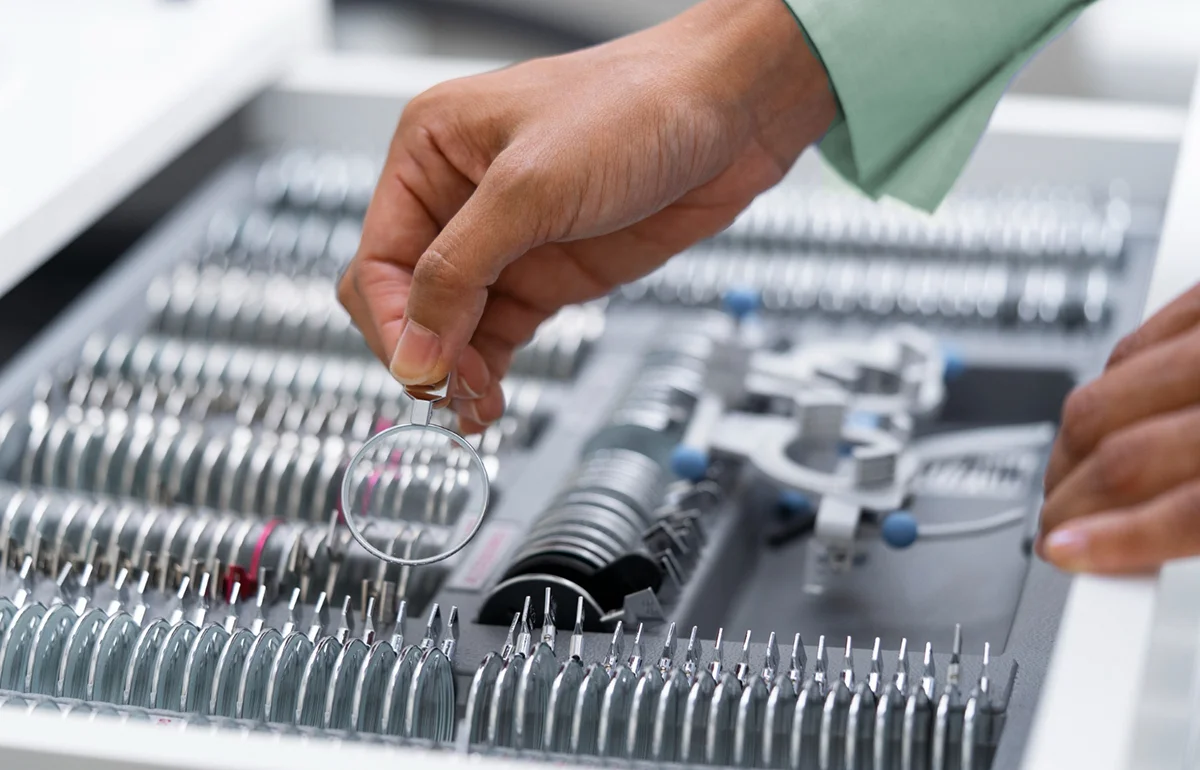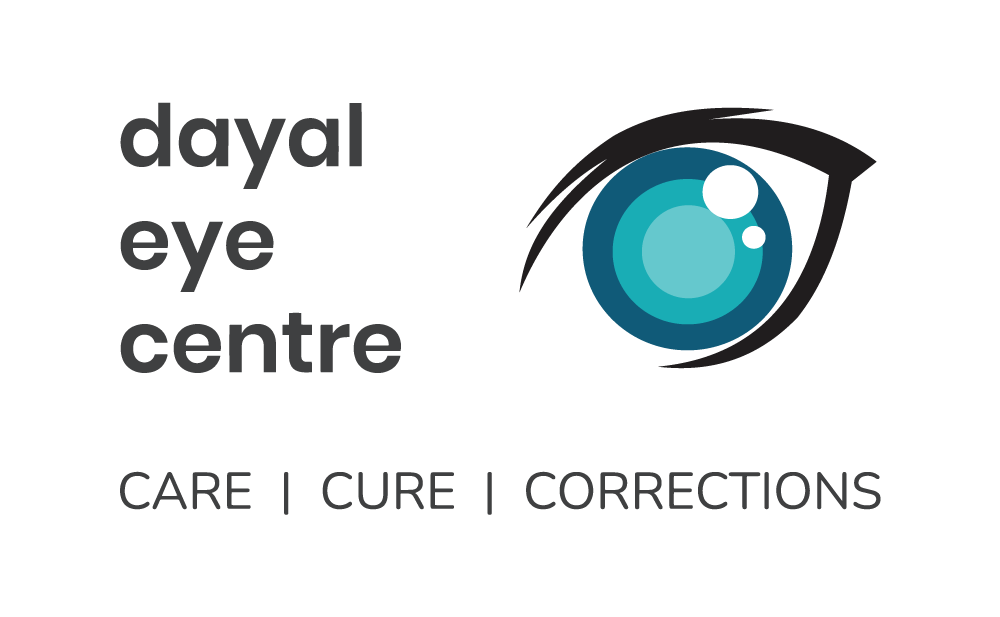Best Cataract Surgery in Gurgaon
A cataract is an eye condition in which the natural lens in the eye becomes cloudy, obstructing the line of vision and causing blurry eyesight. Clouding hinders the performance of simple activities such as reading, driving, or even identifying faces. Surgery is the best option to treat cataracts and gain clear vision.
FEMTO Laser Assisted Cataract Surgery
1,25,000+ Eye Operated
22 Years of Experience
Cashless Payment
NABH Accredited
Advanced Technology
Expert Professionals
Personalized Care
On Time Service
20+ Years of Trust
Excellence Achieved in Eye Care Field









Dayal Eye Centre
Dayal Eye Centre always prioritizes your eyes first. Our motto, “You and Your Eyes Are Our Top Priority,” reflects our dedication to giving the best care and enabling you to restore your vision. More than 1,20,000 successful surgeries reflect the expertise of our skilled doctors and specialists, who are committed to providing the right treatment for you.
We utilize the newest technology to guarantee the best possible outcome. Dayal Eye Centre is an NABH-accredited hospital, so we adhere to the highest standards of care. Our mission is to offer reliable and affordable solutions for your vision.
Select Dayal Eye Centre for professional care and a welcoming staff. We are here to assist in restoring your vision and improving your way of life.
What Is Cataract Surgery?
Cataract surgery is a procedure used to treat cataracts. Cataracts are cloudy areas that form on the natural lens of the eye, causing blurry or hazy vision. During the surgery, the cloudy lens is removed and replaced with an artificial, clear lens (intraocular lens, or IOL), which helps restore clear vision.
The surgery is typically performed as an outpatient procedure, meaning you can go home the same day. It takes only 10 to 15 minutes, is quick, safe, and most patients experience significant improvement in their vision, often allowing you to return to your normal activities shortly after. We do the surgery using advanced techniques such as laser-assisted surgery for increased precision and faster recovery.
What Causes Cataracts?
Cataracts most commonly result from the natural ageing process. Beginning at age 40, proteins in the lens of the eye begin to degenerate, creating cloudiness.
Other conditions also raise the risk of developing cataracts, such as:
- Family history of cataract
- Diabetes
- Eye injuries
- History of eye surgery for conditions such as glaucoma
- Steroid use for diseases such as arthritis or allergies
- Radiation therapy for cancer
Certain lifestyle factors can cause cataracts to develop more quickly, including:
- Smoking
- Excessive drinking of alcohol
- Excessive exposure to the sun without sunglasses
While aging is the primary cause, these conditions can contribute to cataracts forming earlier or progressing more rapidly.
What are the Symptoms of Cataracts?
- Blurred, cloudy, or dim vision
- Trouble seeing at night
- Sensitivity to light and glare
- Needing brighter light to read or perform other activities
- Seeing halos around lights
- Frequent changes in eyeglass or contact lens prescriptions
- Colors looking faded or yellowed
- Double vision in one eye
Types of Cataract Surgery
- Phacoemulsification (Phaco Surgery)
- Extracapsular Cataract Extraction (ECCE)
- Intracapsular Cataract Extraction (ICCE)
- Laser-Assisted Cataract Surgery (LACS)
- Refractive Lens Exchange with Intraocular Lens (IOL) implants
- Microincision cataract surgery
If your cataract symptoms are minimal, you may just require new glasses or contact lenses. But as cataracts progress, our best doctor for cataract surgery in Gurgaon will eventually suggest surgery for a clearer vision.
Doctor Instructions about Cataract Surgery
Our Youtube Videos

2:15

3:27

1:28

1:33

2:49

1:42

Who Should Undergo Cataract Surgery?
We recommend cataract surgery for those whose cataracts are impairing their vision and obstructing daily activities. You should undergo cataract surgery if you experience:
- Trouble reading
- Difficulty driving, particularly at night
- Difficulty seeing clearly while performing daily activities
Besides, our eye specialist may recommend cataract surgery if you require clear vision of the back of your eye to correct other conditions, including:
- Macular degeneration due to old age
- Retinopathy caused by diabetes
Different types of Cataract Lens
| Type of Cataract Lens | Correction | Limitation | Cost in Gurgaon |
|---|---|---|---|
| Monofocal Lens | Usually Distant Vision | Requires glasses to see near objects | Rs. 18,000 to Rs. 50,000 approx. |
| Multifocal Lens | Both Near and Distant Vision | Reduced contrast sensitivity and glare | Rs. 15,000 to Rs. 90,000 approx. |
| Toric Lens | Corrects both Spherical and Cylindrical Power | May not fully eliminate the need for glasses in some cases | Rs. 45,000 to Rs. 75,000 approx. |
| Accommodating IOLs | Adjusts for both Near and Distant Vision | Cannot treat astigmatism (may require separate laser surgery) | Rs. 1,00,000 to Rs. 1,50,000 approx. |
Our Expert Team
FEMTO LASER ASSISTED CATARACT SURGERY
At Dayal Eye Centre, we now offer Femto Laser-Assisted Cataract Surgery, a new and safer technique for cataract surgery. The surgery involves a laser rather than a blade to create small, precise incisions in the eye, hence making them more precise and gentle. It begins with a machine that maps your eye in a special way. This information is used to direct the laser to cut in the right place and depth to help heal the eye quickly. These incisions heal on their own and decrease the chances of complications after the surgery.
How We are Best for Cataract Surgery in Gurgaon?
Before you take cataract surgery, several tests are a must to make your surgery safe and successful. Through these tests, the doctor gains insight into the health of your eyes and advises the finest method for the surgery.
Test for Existing Glasses Prescription
Our Ophthalmologists will screen for refractive errors such as nearsightedness or farsightedness. This assists us in knowing your present prescription and identifying whether corrections should be made prior to the surgery.
Ocular Examination
This test examines the health of your eyelid, tear film, cornea, and iris. It also detects any pre-existing eye conditions, such as dry eyes or abnormalities that may complicate the surgery. The test further detects the nature of the cataract since soft cataracts are simpler to remove than harder ones.
Biometry Tests
These tests identify the correct power of the lens to be implanted after your cataract is surgically removed. Our physician measures the eye’s length and cornea’s curve to find the most suitable artificial lens for your eyes.
Corneal Topography
If needed, this test takes a more detailed map of your cornea to detect conditions such as astigmatism or keratoconus, which might need special care during surgery.
OCT (Optical Coherence Tomography)
This examination takes high-resolution pictures of the retina to look for any macular problems. It assists our physicians in figuring out if macular problems might impact your eyesight following cataract surgery.
Blood Pressure & Blood Sugar Tests
Knowing your blood pressure and blood sugar levels is important before surgery. High blood pressure can increase the risk of complications, and higher blood sugar can increase the chance of infection after surgery.
These tests ensure that cataract surgery is customized to your specific needs, providing the best chance for a successful outcome.
Cataract surgery is a straightforward procedure that typically takes just 10 to 15 minutes. Here is how the process takes place:
- Our eye doctor will take precise measurements to know the correct lens power for the intraocular lens (IOL). These measurements help ensure the best visual outcome after surgery.
- Local anesthesia is applied to numb the eye area, ensuring that you are comfortable and pain-free during the procedure. You will remain awake but relaxed throughout the surgery.
- A small, precise incision is made in the cornea, the clear outer layer of the eye. This incision provides access to the cataract for removal.
- Special instruments are used to protect the inner parts of the eye during surgery. These tools ensure no damage to delicate structures inside the eye.
- Our surgeon carefully opens the capsular bag, which holds the natural lens.
- The cataract is broken into tiny pieces using ultrasound (phacoemulsification).
- A clear, artificial intraocular lens (IOL) is inserted to replace the cloudy natural lens. This helps restore clear vision, allowing you to restore your vision.
After cataract surgery, here is what to expect during your recovery:
Post-Operative Eye Protection: A protective shield or eye patch is placed on your eye to keep it safe as it heals.
Recovery: Recovery typically begins quickly, with improved vision within a few days, though complete healing may take a few weeks.
Follow-Up Exams: You will attend follow-up exams to monitor the healing process and ensure the surgery was successful.
Regular Exams: After follow-up exams, regular check-ups with our ophthalmologist are important to maintain better eye health.
If cataract surgery is needed in both eyes, the second surgery is typically scheduled after the first eye has healed, often within a few days to two weeks. Glasses, if required, will be prescribed by our doctor 4-6 weeks after the second surgery.
Cataract surgery is generally recommended for individuals experiencing significant vision impairment due to cataracts. However, certain factors must be considered before proceeding with the procedure:
Good Overall Health: Candidates should be in good health, with any chronic conditions like diabetes being well-managed.
No Active Infections or Eye Diseases: It is important that patients are free of active infections or untreated eye conditions that could interfere with surgery or healing.
Comprehensive Medical Evaluation: A review of the medical history, including any prior surgeries, medications, or supplements, is essential to assess potential risks.
Lifestyle Habits: Habits like smoking can affect the body’s healing process after surgery, so lifestyle factors are taken into consideration.
Eye Health Assessment: Our ophthalmologist will thoroughly evaluate the condition of your eyes to know if cataract surgery is suitable.
Each patient is assessed individually, considering their overall health, eye condition, and personal factors. Only after this thorough evaluation can our ophthalmologist analyse whether cataract surgery is the right choice.
To make sure your cataract surgery goes well, follow these simple steps:
Watch for Any Eye Changes: A few weeks before surgery, keep an eye on your eyes. If you notice anything like redness or pain, contact our doctor. Healthy eyes are important for a successful surgery. Also, tell our doctor if you have any other health changes.
Talk About Your Medications: Some medicines might cause problems during surgery. Let our doctor know about the medications you are taking. They may ask you to stop or change some medicines before surgery.
Use the Eye Drops: Our doctor might give you eye drops to use before surgery. Follow their instructions carefully and bring the drops with you on the surgery day.
Stop Using Contact Lenses: Don’t wear your contact lenses for three days before surgery. It is better to wear glasses instead.
Wear Comfortable Clothes and No Makeup: On the day of surgery, wear easy, comfortable clothes. Don’t wear makeup, perfume, or deodorant, as these could affect the surgery.
Follow Fasting Instructions: Don’t eat or drink anything after midnight before surgery. Also, avoid alcohol for at least 24 hours before surgery.
Plan for Your Recovery: Arrange for someone to drive you home after surgery. You will need rest, so try to have help at home for the first few days.
Ask Questions: If you are unsure about anything, ask our doctor. It is important that you feel comfortable and ready for the surgery.
Following these easy steps will help you have a successful cataract surgery and a faster recovery.
More Details About Cataract Surgery in Gurgaon
Total Cost for Cataract Surgery in Gurgaon
Average cost of Cataract Surgery in Gurgaon is Rs, 26,000 to Rs. 93,000 per eye.
Cost includes:
- Surgeon’s fees
- Hospital or clinic charges
- Pre-surgery tests
- Selected intraocular lens (IOL)
- Post-operative consultations
Types of lenses:
- Monofocal lenses: More affordable
- Premium lenses (e.g., trifocal): More expensive
Additional charges may apply for advanced procedures like robotic or laser-assisted surgery.
Pyment Options Available in Dayal Eye Centre
Other Government Schemes
- Ayushman Bharat – Pradhan Mantri Jan Arogya Yojana (PM-JAY)
- National Programme for Control of Blindness & Visual Impairment (NPCBVI)
- Central Government Health Scheme (CGHS)
- Ex-Servicemen Contributory Health Scheme (ECHS)
- Employees’ State Insurance Scheme (ESIS)

Why Choose Us for Cataract Surgery?
- Cataract surgery at Dayal Eye Centre, Gurgaon, is a highly effective treatment for vision problems caused by cataracts.
- The primary benefit is a significant improvement in vision as the cloudy lens is replaced with a clear artificial one.
- Most of our patients experience clearer vision, improved quality of life, and greater confidence in daily activities like driving and reading.
- The surgery done by us has a high success rate with minimal discomfort.

Recovery Tips after Cataract Surgery
Done in Gurgaon
- After cataract surgery, rest is crucial for proper healing.
- You must avoid heavy lifting, bending, or straining in the first few days.
- Follow the prescribed eye drop schedule to prevent infection and reduce inflammation.
- Wear protective glasses to keep your eyes protected from bright light.
- Attend follow-up appointments to track progress, and avoid rubbing or touching your eyes to guarantee a smooth recovery process.

Risk or Complications in Cataract Surgery
- Similar to any surgery, cataract surgery has a minor risk of complications.
- Infection, inflammation, or blurry vision can happen but usually can be treated with medicine.
- Retinal detachment or chronic vision problems can occur rarely, particularly in patients who have underlying eye disease.
- By following our doctor's prescriptions and following up, most of the risks can be avoided for a smooth recovery.
Frequently Asked Questions
It is a condition that happens after thinning of the cornea which results in bulging and cone-shaped cornea hindering the focus of the images formed. It is a progressive, bilateral, asymmetrical, and non-inflammatory infection that affects the cornea of the eye leading to the thinning of the cornea.
can cataract surgery be done twice
cataract surgery is needed only once in one eye. Its a very successful surgery and restores vision completely.
what to eat after cataract surgery ?
A normal diet which is nutritious and easily digestible can be started after cataract surgery on the same day . It’s important to keep the patient well hydrated and to avoid constipation. This will prevent patients from straining .
is cataracts genetic?
Cataract is not genetic but it can be present from birth if the baby is exposed to certain infections inside the mother’s womb. This is also surgically treated to allow for vision of the baby to develop.
is cataract surgery tax deductible
Cataract surgery is cashless for all insurance and many govt beneficiary schemes.
can ayurveda cure cataract?
As cataract is related to aging and aging is a natural process, ayurveda can not cure cataract.




